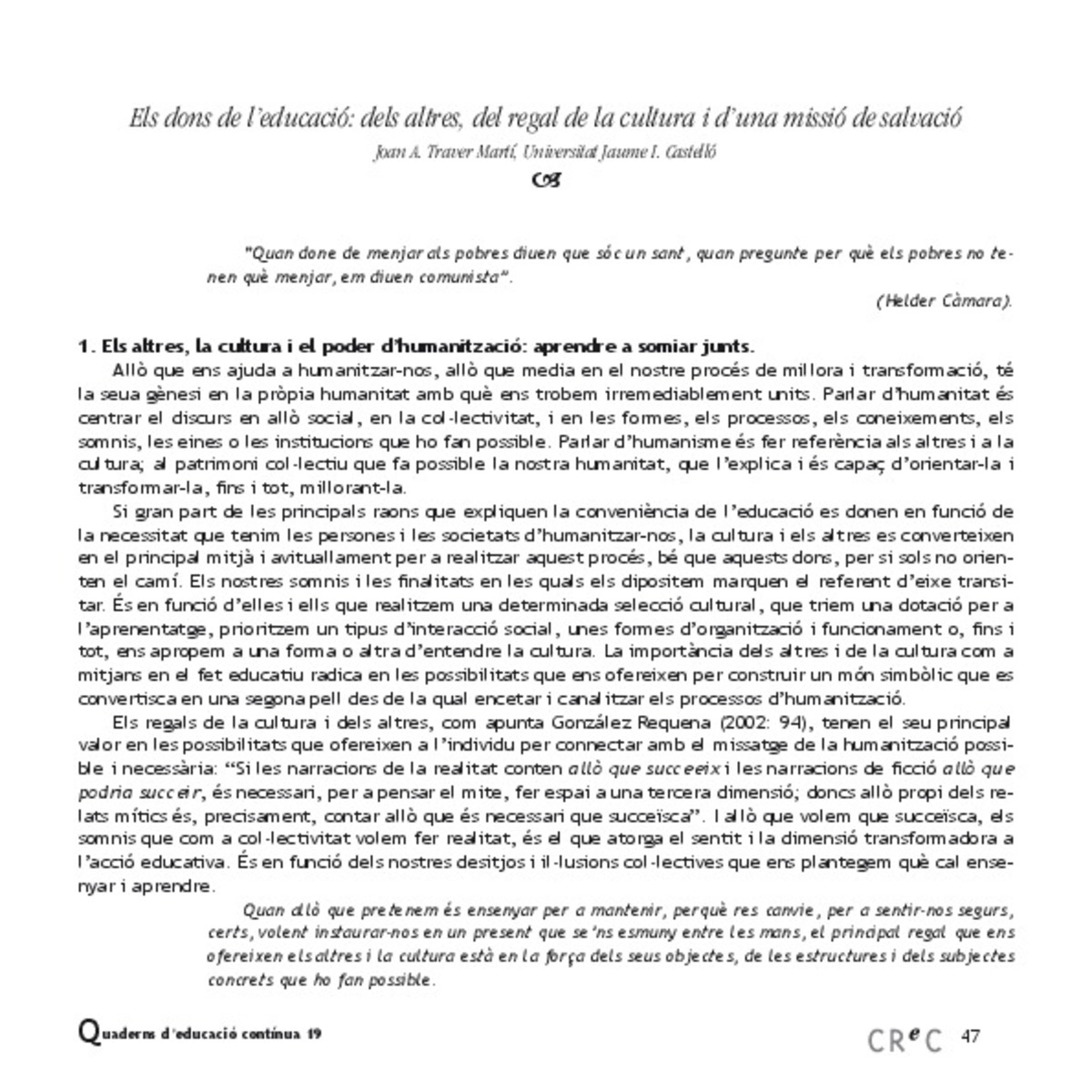Mostrar el registro sencillo del ítem
Els dons de l’educació: dels altres, del regal de la cultura i d’una missió de salvació
| dc.contributor.author | Traver-Martí, Joan Andrés | |
| dc.date.accessioned | 2011-06-27T10:06:22Z | |
| dc.date.available | 2011-06-27T10:06:22Z | |
| dc.date.issued | 2008 | |
| dc.identifier.citation | TRAVER-MARTÍ, Joan Andrés. Els dons de l’educació: dels altres, del regal de la cultura i d’una missió de salvació. Quaderns d'educació contínua, 2008, n. 19 pp. 47-63 | |
| dc.identifier.issn | 1575-9016 | |
| dc.identifier.uri | http://hdl.handle.net/10234/24562 | |
| dc.description.abstract | Activar el desig d’educar, seduir el nostre alumnat per a recuperar el plaer d’aprendre en la societat de la informació i de la cultura audiovisual només es pot aconseguir aprofitant els recursos de la cultura de la iconosfera i conciliant antics antagonismes psicològics, sociològics i culturals: emoció i raó, mite i ciència, plaer i esforç, imatge i paraula Algunes de les principals lloses que dificulten els camins de transformació i innovació docent les podem sintetitzar en les següents: la cultura del toreig o de l’evitació, la cultura de la culpa, la cultura de la queixa, la cultura del turista o del col·leccionista, la cultura de la comoditat, la cultura del franctirador o la cultura arborescent i la cultura professionalista Les mestres i els mestres que fan possibles alguns dels somnis educatius de major justícia social, sense cap lloc a dubtes, són persones vitalistes, compromeses amb el seu temps i amb les seues gents, implicades en la seua pròpia realitat social i histórica | |
| dc.description.abstract | Activating the desire to educate; captivating our students to regain the pleasure of learning in the information society and the audiovisual culture can only be achieved using the resources of the culture of iconosphere and reconciling old psychological, sociological and cultural antagonisms: reason and emotion, myth and science, pleasure and effort, word and image. We can summarize some of the main slabs that impede the path of transformation and innovation in teaching as follows: the culture of dodging or avoidance, the culture of blame, the culture of complaint, the culture of the tourist or the collector, the culture of comfort, the culture of the sniper or the arborescence and the professionalizing culture. Teachers who make possible some of the educational dreams of a greater social justice, without any doubt, are vital people, committed with their time and their fellow human beings; people involved in their own social and historical reality. | |
| dc.format.extent | 17 p. | |
| dc.language.iso | cat | |
| dc.publisher | Centre de Recursos i Educació Contínua (Xàtiva) | |
| dc.relation.isPartOf | Quaderns d'educació contínua, 2008, n. 19 | |
| dc.rights | © Centre de Recursos i Educació Contínua (Xàtiva) | |
| dc.rights.uri | http://rightsstatements.org/vocab/InC/1.0/ | * |
| dc.subject | Educació | |
| dc.subject | Cultura | |
| dc.subject | Humanitat | |
| dc.subject | Dons | |
| dc.subject | Desig d’educar | |
| dc.subject | Education | |
| dc.subject | Culture | |
| dc.subject | Humanity | |
| dc.subject | Gifts | |
| dc.subject | Desire to educate | |
| dc.subject.lcsh | Educational anthropology | |
| dc.subject.other | Antropologia educativa | |
| dc.title | Els dons de l’educació: dels altres, del regal de la cultura i d’una missió de salvació | |
| dc.type | info:eu-repo/semantics/article | |
| dc.rights.accessRights | info:eu-repo/semantics/openAccess | |
| dc.relation.publisherVersion | http://www.crec.info/#/portfolio-02-00 |
Ficheros en el ítem
Este ítem aparece en la(s) siguiente(s) colección(ones)
-
EDU_Articles [500]







